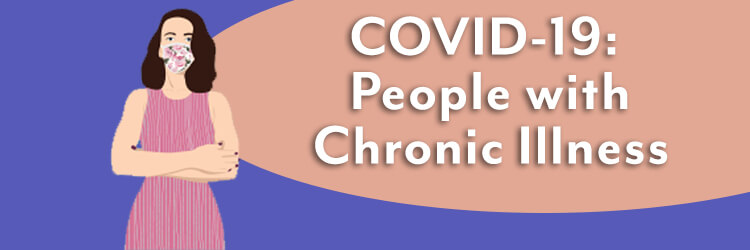[vc_row][vc_column][vc_column_text]Most of us know that people with chronic illness are at higher risk for complications if infected with COVID-19. Apart from staying home—which some people can’t do because of their jobs—those with underlying conditions may feel little control over a scary situation. This is hard on mental health. At a time when there is greater need to manage underlying conditions, people may face barriers.
The healthcare system is overwhelmed. Doctor’s offices are canceling appointments deemed non-essential—but things like check-ups are essential for people with chronic illness. Doctors need to monitor patients’ conditions. They can’t do that without seeing those patients.
Even people not in high risk groups may hesitate to visit the doctor for fear of contracting COVID-19. Those in high risk groups are receiving extra messaging to stay home. They may be afraid to pick up prescriptions or visit any healthcare setting. If you aren’t able to receive care for the illness putting you at higher risk, it could leave you feeling even more vulnerable.
Even before the pandemic, having a chronic illness put people at greater risk for mental health disorders. According to the CDC, people with a chronic disease are more likely to suffer from Depression. Depression co-occurs in 17% of people with cardiovascular conditions, 27% of people with diabetes, and 40% of people with cancer.
A lot of the articles I found about chronic illness and mental health talked about hopelessness. “Chronic” means you will have to live with the disease indefinitely. Often the illness causes pain, worry, or significant changes in day-to-day life. Coming to terms with that reality can take a big toll on a person’s mental health. Hopelessness might take hold.
But hopelessness is in high supply in general right now. People who haven’t had a chronic illness might be processing for the first time what those with health conditions have already been through. The pandemic will continue indefinitely. People have to come to terms with a new reality. Perhaps in some ways, those with chronic illness are more equipped to deal with what is happening. Not only do they have experience facing a “new normal”—most people with an underlying condition have had to think about protecting their health more than the average person.
But that doesn’t mean they have experience with it on this extreme level. People with chronic illness are being asked to take extra precautions to stay safe, at a time when many people who can are staying home. It may feel that there’s nothing else to do to keep safe, which could cause more feelings of hopelessness. The very conditions that may already make their life harder put people with chronic illness at higher risk for severe illness. It’s yet another new reality to process on top of any other feelings about the pandemic.
This is bound to exacerbate anxiety or depression. And when stress levels are high, substance use also increases. And mental health affects physical health. Stress can cause or exacerbate all sorts of health problems. It can also impact sleep, which in turn will have an effect on overall health. Even when it’s not a pandemic, those with chronic illness should receive healthcare that takes mental health into account. Otherwise it’s missing something important.
If you are struggling with a substance use or mental health disorder during this crisis, there is hope. TruHealing Centers is open and here for you, with hospital-grade sanitization of our facilities to ensure your safety in treatment. At our facilities across the country, our staff will empower you to build a life in long-term recovery. Call an admissions specialist at 410-593-0005.[/vc_column_text][/vc_column][/vc_row]









